Evidence-Based Essay on the Use of Personality Tests at Work
VerifiedAdded on 2022/11/09
|7
|1437
|60
Essay
AI Summary
This essay critically analyzes the use of personality tests in the workplace, focusing on their application in recruitment, promotion, and employee development. It explores the advantages and disadvantages of using personality questionnaires, considering their impact on hiring decisions, team dynamics, and employee self-reflection. The essay examines various personality tests, such as the Myers-Briggs Type Indicator (MBTI), and discusses their role in understanding individual traits and behaviors. It also addresses the limitations of these tests, including potential biases and the changing nature of personality over time. Furthermore, the essay provides a self-reflective analysis using the MBTI to understand the author's own personality traits. Ultimately, the essay concludes that personality questionnaires are valuable tools for assessing candidates and employees, but should not be the sole factor in decision-making. The essay uses evidence from various sources to support the arguments presented, and also includes an appendix with the results of the self-reflection test. This is a well-structured and comprehensive analysis that provides a detailed overview of the topic.
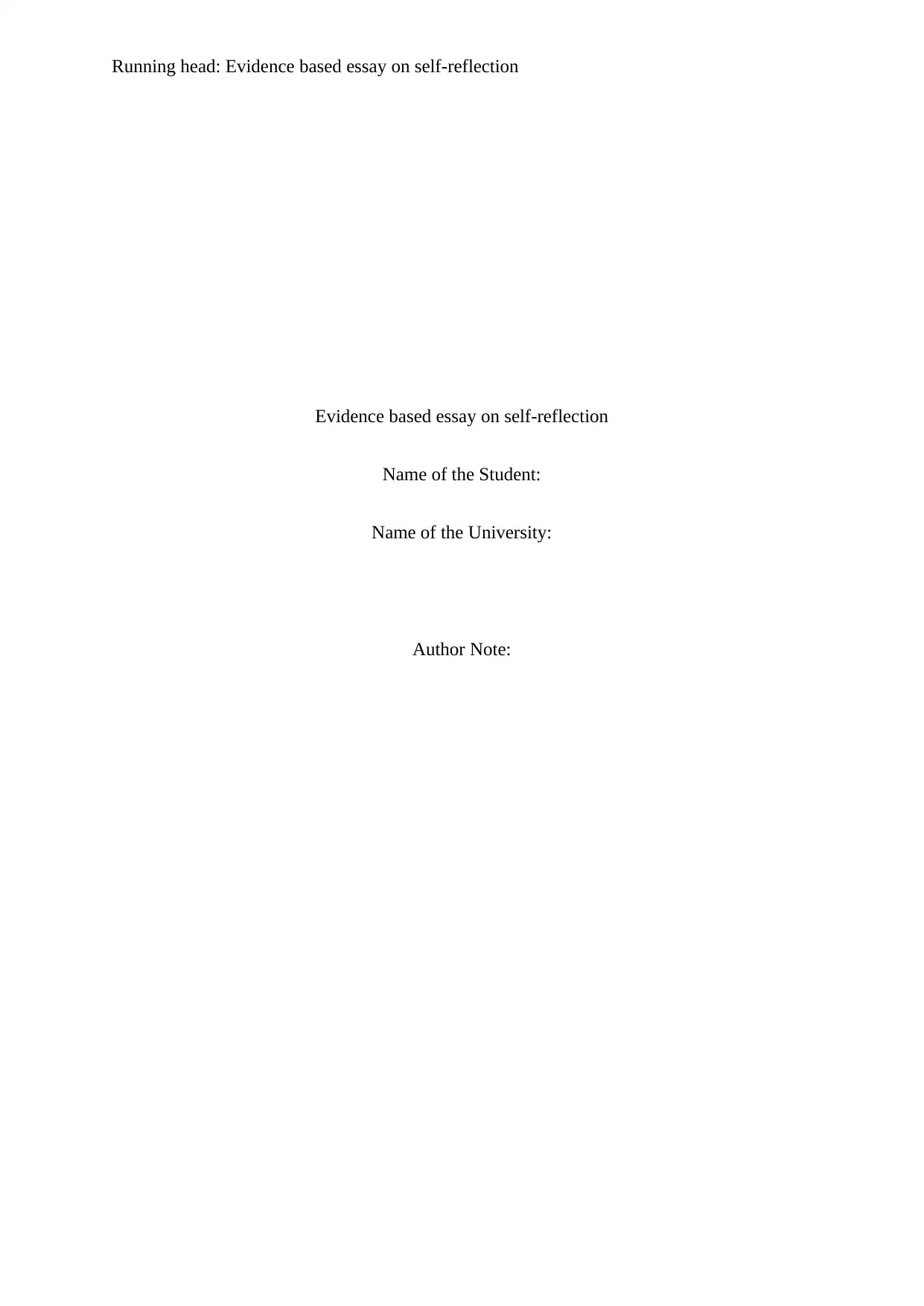
Running head: Evidence based essay on self-reflection
Evidence based essay on self-reflection
Name of the Student:
Name of the University:
Author Note:
Evidence based essay on self-reflection
Name of the Student:
Name of the University:
Author Note:
Paraphrase This Document
Need a fresh take? Get an instant paraphrase of this document with our AI Paraphraser
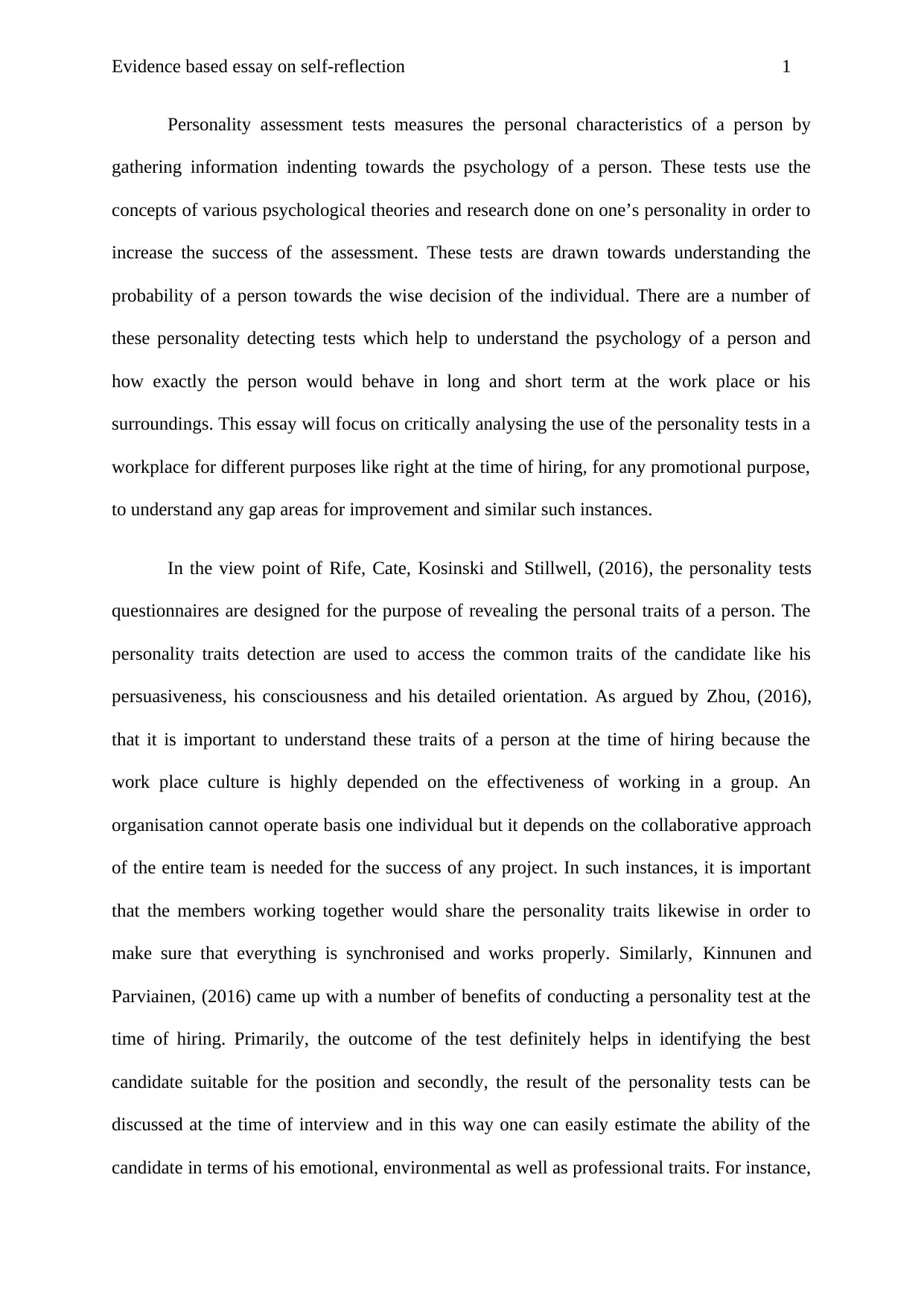
Evidence based essay on self-reflection 1
Personality assessment tests measures the personal characteristics of a person by
gathering information indenting towards the psychology of a person. These tests use the
concepts of various psychological theories and research done on one’s personality in order to
increase the success of the assessment. These tests are drawn towards understanding the
probability of a person towards the wise decision of the individual. There are a number of
these personality detecting tests which help to understand the psychology of a person and
how exactly the person would behave in long and short term at the work place or his
surroundings. This essay will focus on critically analysing the use of the personality tests in a
workplace for different purposes like right at the time of hiring, for any promotional purpose,
to understand any gap areas for improvement and similar such instances.
In the view point of Rife, Cate, Kosinski and Stillwell, (2016), the personality tests
questionnaires are designed for the purpose of revealing the personal traits of a person. The
personality traits detection are used to access the common traits of the candidate like his
persuasiveness, his consciousness and his detailed orientation. As argued by Zhou, (2016),
that it is important to understand these traits of a person at the time of hiring because the
work place culture is highly depended on the effectiveness of working in a group. An
organisation cannot operate basis one individual but it depends on the collaborative approach
of the entire team is needed for the success of any project. In such instances, it is important
that the members working together would share the personality traits likewise in order to
make sure that everything is synchronised and works properly. Similarly, Kinnunen and
Parviainen, (2016) came up with a number of benefits of conducting a personality test at the
time of hiring. Primarily, the outcome of the test definitely helps in identifying the best
candidate suitable for the position and secondly, the result of the personality tests can be
discussed at the time of interview and in this way one can easily estimate the ability of the
candidate in terms of his emotional, environmental as well as professional traits. For instance,
Personality assessment tests measures the personal characteristics of a person by
gathering information indenting towards the psychology of a person. These tests use the
concepts of various psychological theories and research done on one’s personality in order to
increase the success of the assessment. These tests are drawn towards understanding the
probability of a person towards the wise decision of the individual. There are a number of
these personality detecting tests which help to understand the psychology of a person and
how exactly the person would behave in long and short term at the work place or his
surroundings. This essay will focus on critically analysing the use of the personality tests in a
workplace for different purposes like right at the time of hiring, for any promotional purpose,
to understand any gap areas for improvement and similar such instances.
In the view point of Rife, Cate, Kosinski and Stillwell, (2016), the personality tests
questionnaires are designed for the purpose of revealing the personal traits of a person. The
personality traits detection are used to access the common traits of the candidate like his
persuasiveness, his consciousness and his detailed orientation. As argued by Zhou, (2016),
that it is important to understand these traits of a person at the time of hiring because the
work place culture is highly depended on the effectiveness of working in a group. An
organisation cannot operate basis one individual but it depends on the collaborative approach
of the entire team is needed for the success of any project. In such instances, it is important
that the members working together would share the personality traits likewise in order to
make sure that everything is synchronised and works properly. Similarly, Kinnunen and
Parviainen, (2016) came up with a number of benefits of conducting a personality test at the
time of hiring. Primarily, the outcome of the test definitely helps in identifying the best
candidate suitable for the position and secondly, the result of the personality tests can be
discussed at the time of interview and in this way one can easily estimate the ability of the
candidate in terms of his emotional, environmental as well as professional traits. For instance,
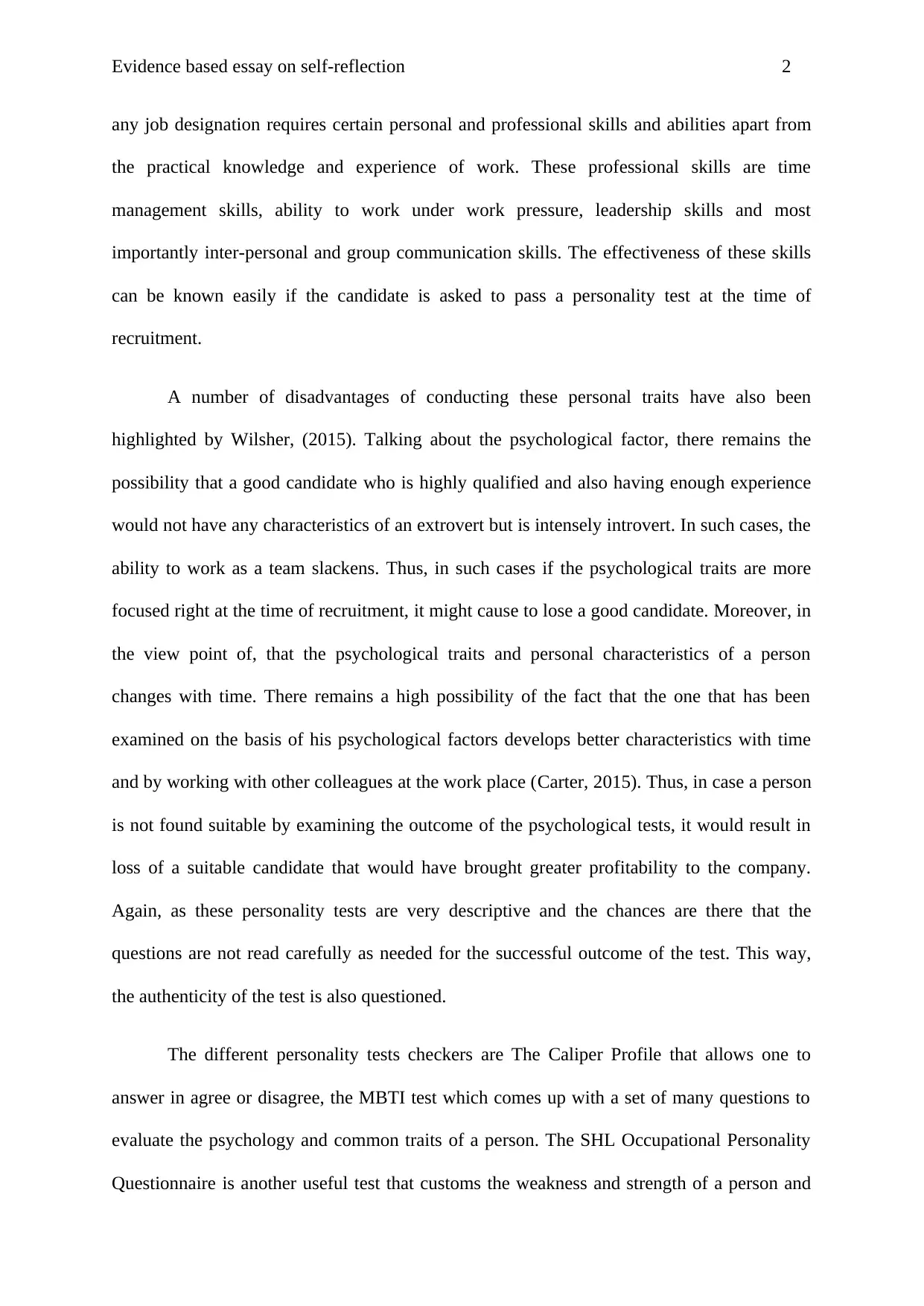
Evidence based essay on self-reflection 2
any job designation requires certain personal and professional skills and abilities apart from
the practical knowledge and experience of work. These professional skills are time
management skills, ability to work under work pressure, leadership skills and most
importantly inter-personal and group communication skills. The effectiveness of these skills
can be known easily if the candidate is asked to pass a personality test at the time of
recruitment.
A number of disadvantages of conducting these personal traits have also been
highlighted by Wilsher, (2015). Talking about the psychological factor, there remains the
possibility that a good candidate who is highly qualified and also having enough experience
would not have any characteristics of an extrovert but is intensely introvert. In such cases, the
ability to work as a team slackens. Thus, in such cases if the psychological traits are more
focused right at the time of recruitment, it might cause to lose a good candidate. Moreover, in
the view point of, that the psychological traits and personal characteristics of a person
changes with time. There remains a high possibility of the fact that the one that has been
examined on the basis of his psychological factors develops better characteristics with time
and by working with other colleagues at the work place (Carter, 2015). Thus, in case a person
is not found suitable by examining the outcome of the psychological tests, it would result in
loss of a suitable candidate that would have brought greater profitability to the company.
Again, as these personality tests are very descriptive and the chances are there that the
questions are not read carefully as needed for the successful outcome of the test. This way,
the authenticity of the test is also questioned.
The different personality tests checkers are The Caliper Profile that allows one to
answer in agree or disagree, the MBTI test which comes up with a set of many questions to
evaluate the psychology and common traits of a person. The SHL Occupational Personality
Questionnaire is another useful test that customs the weakness and strength of a person and
any job designation requires certain personal and professional skills and abilities apart from
the practical knowledge and experience of work. These professional skills are time
management skills, ability to work under work pressure, leadership skills and most
importantly inter-personal and group communication skills. The effectiveness of these skills
can be known easily if the candidate is asked to pass a personality test at the time of
recruitment.
A number of disadvantages of conducting these personal traits have also been
highlighted by Wilsher, (2015). Talking about the psychological factor, there remains the
possibility that a good candidate who is highly qualified and also having enough experience
would not have any characteristics of an extrovert but is intensely introvert. In such cases, the
ability to work as a team slackens. Thus, in such cases if the psychological traits are more
focused right at the time of recruitment, it might cause to lose a good candidate. Moreover, in
the view point of, that the psychological traits and personal characteristics of a person
changes with time. There remains a high possibility of the fact that the one that has been
examined on the basis of his psychological factors develops better characteristics with time
and by working with other colleagues at the work place (Carter, 2015). Thus, in case a person
is not found suitable by examining the outcome of the psychological tests, it would result in
loss of a suitable candidate that would have brought greater profitability to the company.
Again, as these personality tests are very descriptive and the chances are there that the
questions are not read carefully as needed for the successful outcome of the test. This way,
the authenticity of the test is also questioned.
The different personality tests checkers are The Caliper Profile that allows one to
answer in agree or disagree, the MBTI test which comes up with a set of many questions to
evaluate the psychology and common traits of a person. The SHL Occupational Personality
Questionnaire is another useful test that customs the weakness and strength of a person and
⊘ This is a preview!⊘
Do you want full access?
Subscribe today to unlock all pages.

Trusted by 1+ million students worldwide
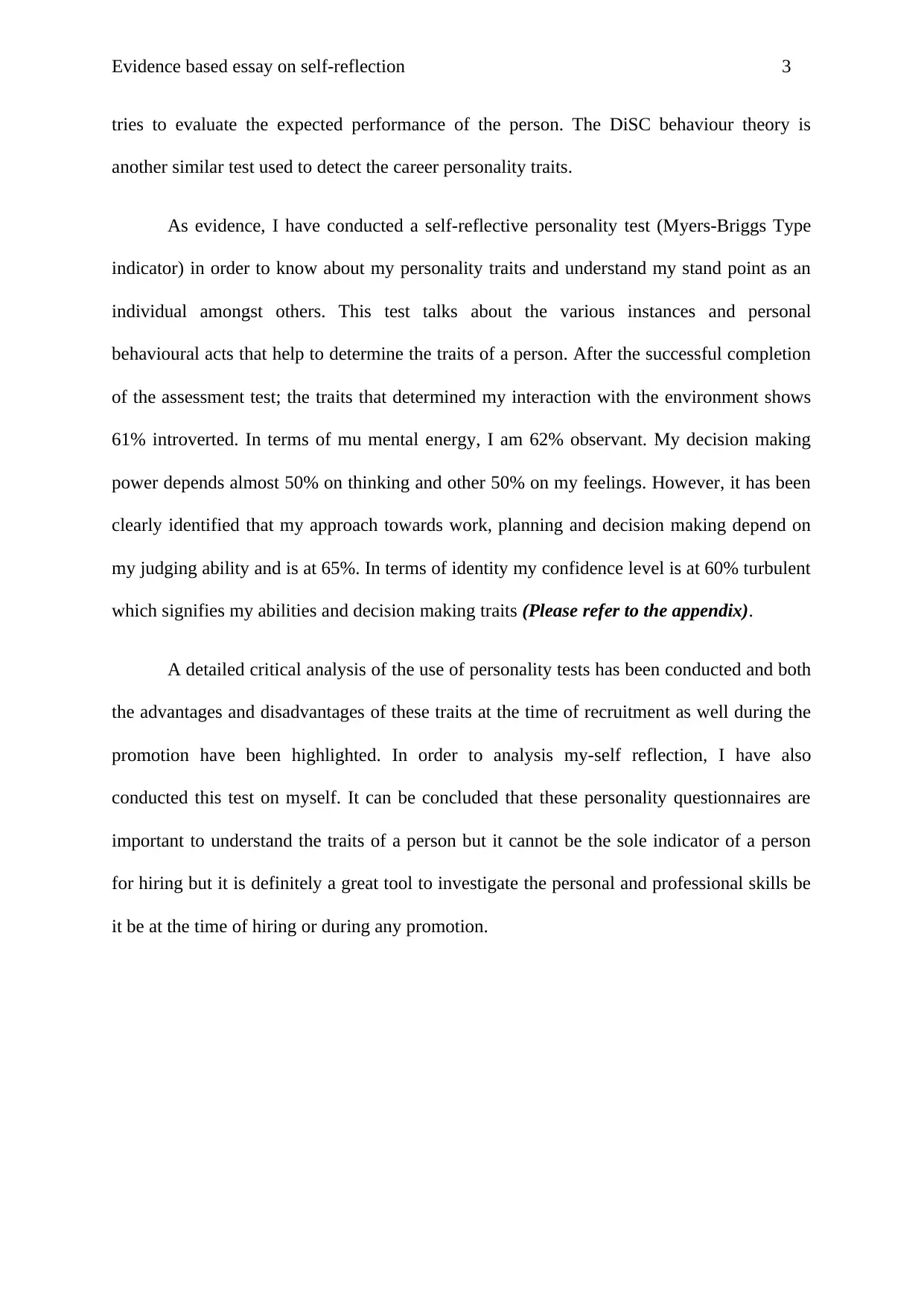
Evidence based essay on self-reflection 3
tries to evaluate the expected performance of the person. The DiSC behaviour theory is
another similar test used to detect the career personality traits.
As evidence, I have conducted a self-reflective personality test (Myers-Briggs Type
indicator) in order to know about my personality traits and understand my stand point as an
individual amongst others. This test talks about the various instances and personal
behavioural acts that help to determine the traits of a person. After the successful completion
of the assessment test; the traits that determined my interaction with the environment shows
61% introverted. In terms of mu mental energy, I am 62% observant. My decision making
power depends almost 50% on thinking and other 50% on my feelings. However, it has been
clearly identified that my approach towards work, planning and decision making depend on
my judging ability and is at 65%. In terms of identity my confidence level is at 60% turbulent
which signifies my abilities and decision making traits (Please refer to the appendix).
A detailed critical analysis of the use of personality tests has been conducted and both
the advantages and disadvantages of these traits at the time of recruitment as well during the
promotion have been highlighted. In order to analysis my-self reflection, I have also
conducted this test on myself. It can be concluded that these personality questionnaires are
important to understand the traits of a person but it cannot be the sole indicator of a person
for hiring but it is definitely a great tool to investigate the personal and professional skills be
it be at the time of hiring or during any promotion.
tries to evaluate the expected performance of the person. The DiSC behaviour theory is
another similar test used to detect the career personality traits.
As evidence, I have conducted a self-reflective personality test (Myers-Briggs Type
indicator) in order to know about my personality traits and understand my stand point as an
individual amongst others. This test talks about the various instances and personal
behavioural acts that help to determine the traits of a person. After the successful completion
of the assessment test; the traits that determined my interaction with the environment shows
61% introverted. In terms of mu mental energy, I am 62% observant. My decision making
power depends almost 50% on thinking and other 50% on my feelings. However, it has been
clearly identified that my approach towards work, planning and decision making depend on
my judging ability and is at 65%. In terms of identity my confidence level is at 60% turbulent
which signifies my abilities and decision making traits (Please refer to the appendix).
A detailed critical analysis of the use of personality tests has been conducted and both
the advantages and disadvantages of these traits at the time of recruitment as well during the
promotion have been highlighted. In order to analysis my-self reflection, I have also
conducted this test on myself. It can be concluded that these personality questionnaires are
important to understand the traits of a person but it cannot be the sole indicator of a person
for hiring but it is definitely a great tool to investigate the personal and professional skills be
it be at the time of hiring or during any promotion.
Paraphrase This Document
Need a fresh take? Get an instant paraphrase of this document with our AI Paraphraser
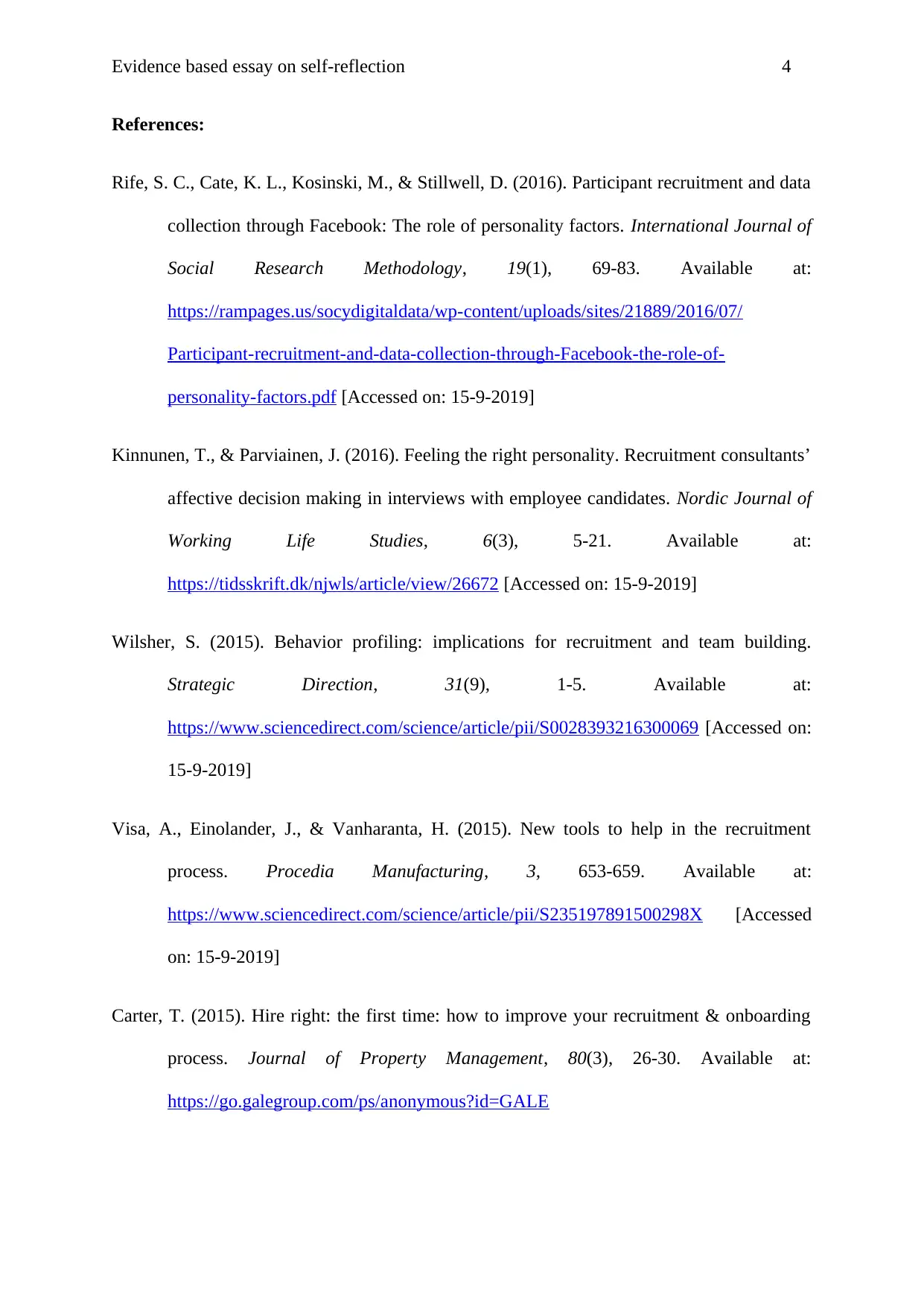
Evidence based essay on self-reflection 4
References:
Rife, S. C., Cate, K. L., Kosinski, M., & Stillwell, D. (2016). Participant recruitment and data
collection through Facebook: The role of personality factors. International Journal of
Social Research Methodology, 19(1), 69-83. Available at:
https://rampages.us/socydigitaldata/wp-content/uploads/sites/21889/2016/07/
Participant-recruitment-and-data-collection-through-Facebook-the-role-of-
personality-factors.pdf [Accessed on: 15-9-2019]
Kinnunen, T., & Parviainen, J. (2016). Feeling the right personality. Recruitment consultants’
affective decision making in interviews with employee candidates. Nordic Journal of
Working Life Studies, 6(3), 5-21. Available at:
https://tidsskrift.dk/njwls/article/view/26672 [Accessed on: 15-9-2019]
Wilsher, S. (2015). Behavior profiling: implications for recruitment and team building.
Strategic Direction, 31(9), 1-5. Available at:
https://www.sciencedirect.com/science/article/pii/S0028393216300069 [Accessed on:
15-9-2019]
Visa, A., Einolander, J., & Vanharanta, H. (2015). New tools to help in the recruitment
process. Procedia Manufacturing, 3, 653-659. Available at:
https://www.sciencedirect.com/science/article/pii/S235197891500298X [Accessed
on: 15-9-2019]
Carter, T. (2015). Hire right: the first time: how to improve your recruitment & onboarding
process. Journal of Property Management, 80(3), 26-30. Available at:
https://go.galegroup.com/ps/anonymous?id=GALE
References:
Rife, S. C., Cate, K. L., Kosinski, M., & Stillwell, D. (2016). Participant recruitment and data
collection through Facebook: The role of personality factors. International Journal of
Social Research Methodology, 19(1), 69-83. Available at:
https://rampages.us/socydigitaldata/wp-content/uploads/sites/21889/2016/07/
Participant-recruitment-and-data-collection-through-Facebook-the-role-of-
personality-factors.pdf [Accessed on: 15-9-2019]
Kinnunen, T., & Parviainen, J. (2016). Feeling the right personality. Recruitment consultants’
affective decision making in interviews with employee candidates. Nordic Journal of
Working Life Studies, 6(3), 5-21. Available at:
https://tidsskrift.dk/njwls/article/view/26672 [Accessed on: 15-9-2019]
Wilsher, S. (2015). Behavior profiling: implications for recruitment and team building.
Strategic Direction, 31(9), 1-5. Available at:
https://www.sciencedirect.com/science/article/pii/S0028393216300069 [Accessed on:
15-9-2019]
Visa, A., Einolander, J., & Vanharanta, H. (2015). New tools to help in the recruitment
process. Procedia Manufacturing, 3, 653-659. Available at:
https://www.sciencedirect.com/science/article/pii/S235197891500298X [Accessed
on: 15-9-2019]
Carter, T. (2015). Hire right: the first time: how to improve your recruitment & onboarding
process. Journal of Property Management, 80(3), 26-30. Available at:
https://go.galegroup.com/ps/anonymous?id=GALE
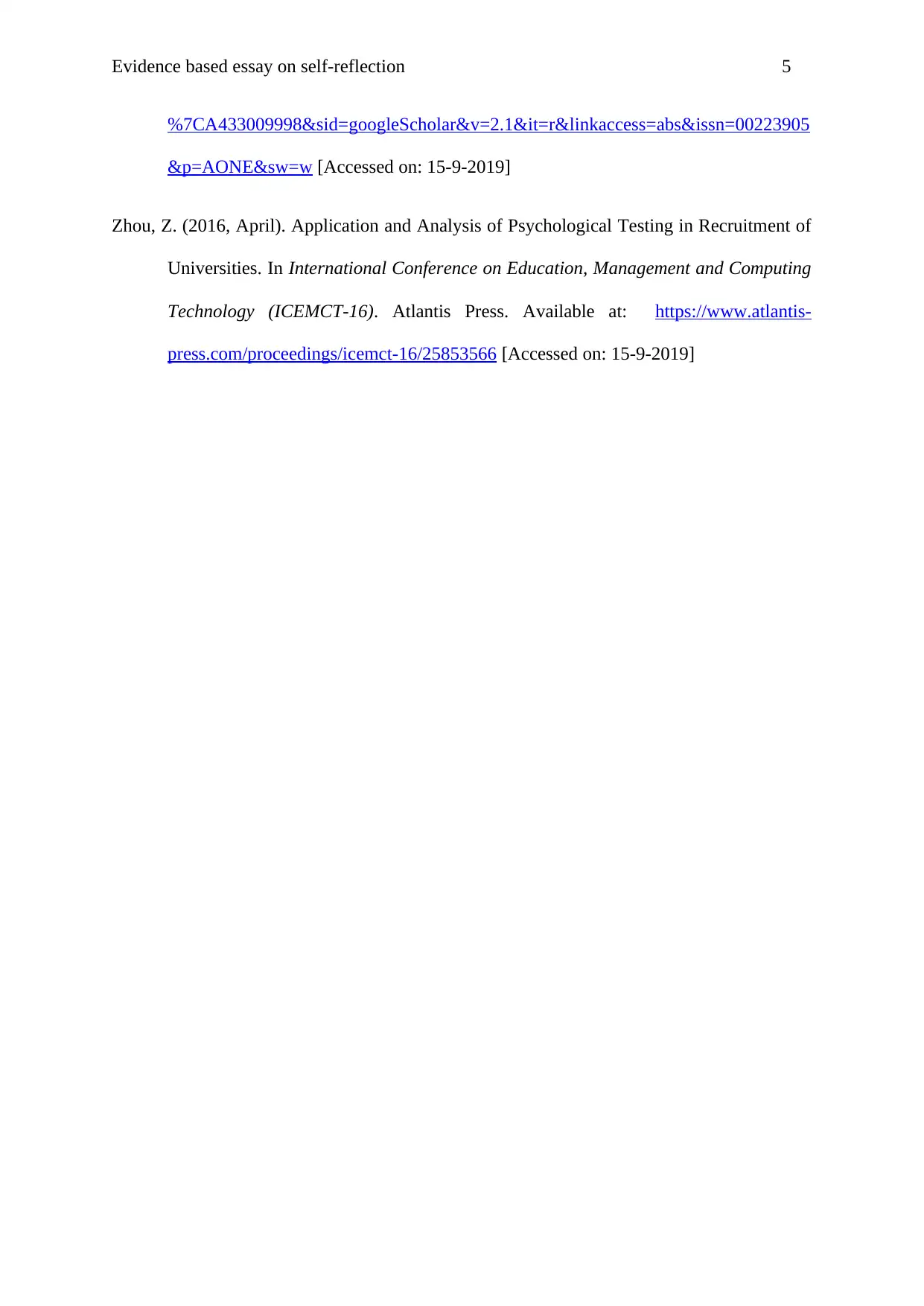
Evidence based essay on self-reflection 5
%7CA433009998&sid=googleScholar&v=2.1&it=r&linkaccess=abs&issn=00223905
&p=AONE&sw=w [Accessed on: 15-9-2019]
Zhou, Z. (2016, April). Application and Analysis of Psychological Testing in Recruitment of
Universities. In International Conference on Education, Management and Computing
Technology (ICEMCT-16). Atlantis Press. Available at: https://www.atlantis-
press.com/proceedings/icemct-16/25853566 [Accessed on: 15-9-2019]
%7CA433009998&sid=googleScholar&v=2.1&it=r&linkaccess=abs&issn=00223905
&p=AONE&sw=w [Accessed on: 15-9-2019]
Zhou, Z. (2016, April). Application and Analysis of Psychological Testing in Recruitment of
Universities. In International Conference on Education, Management and Computing
Technology (ICEMCT-16). Atlantis Press. Available at: https://www.atlantis-
press.com/proceedings/icemct-16/25853566 [Accessed on: 15-9-2019]
⊘ This is a preview!⊘
Do you want full access?
Subscribe today to unlock all pages.

Trusted by 1+ million students worldwide
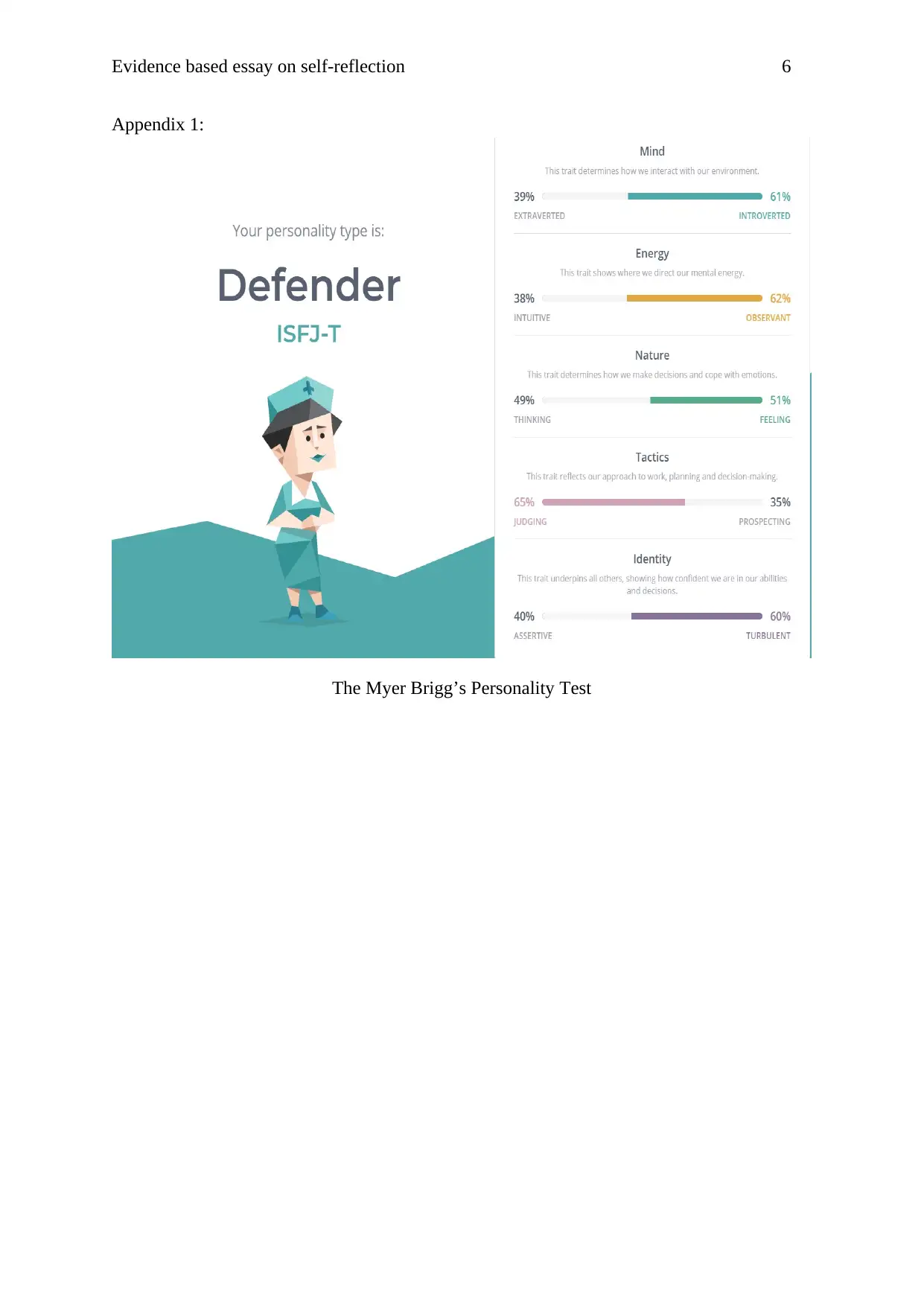
Evidence based essay on self-reflection 6
Appendix 1:
The Myer Brigg’s Personality Test
Appendix 1:
The Myer Brigg’s Personality Test
1 out of 7
Related Documents
Your All-in-One AI-Powered Toolkit for Academic Success.
+13062052269
info@desklib.com
Available 24*7 on WhatsApp / Email
![[object Object]](/_next/static/media/star-bottom.7253800d.svg)
Unlock your academic potential
Copyright © 2020–2025 A2Z Services. All Rights Reserved. Developed and managed by ZUCOL.





